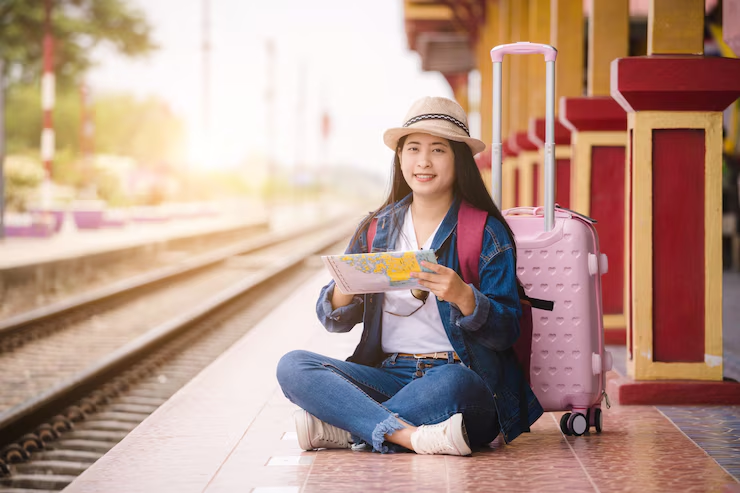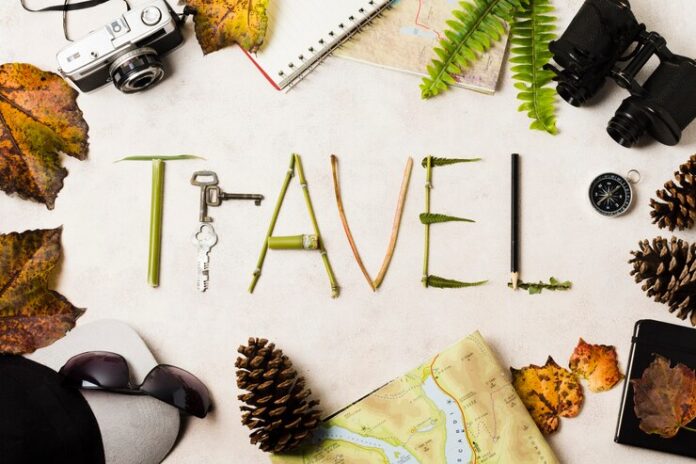Traveling can be one of the most exciting and enriching experiences of your life, whether you’re going on a short vacation, a long-term journey, or a spontaneous adventure. However, to make the most of your trip and ensure that everything goes smoothly, preparation is key. These seven essential travel tips will help you plan effectively, avoid common pitfalls, and maximize the enjoyment of your big adventure. Whether you’re a seasoned traveler or someone embarking on your first big trip, these practical insights are sure to be useful.
1. Plan Your Budget in Advance

One of the most critical aspects of any trip is knowing how much you are willing and able to spend. Traveling without a budget can quickly lead to overspending, which could leave you stressed out or unable to fully enjoy your time abroad. Whether you’re traveling on a shoestring budget or have more to spend, planning your finances will give you a better understanding of what’s possible during your trip.
Why Budgeting is Crucial
- Prevents Over-Spending: Planning in advance ensures you stay within your limits. This includes setting aside money for accommodations, food, transportation, activities, and emergency funds.
- Maximizes Your Experience: When you know how much you can afford to spend, you can make smarter choices—like opting for free or inexpensive activities, staying in budget-friendly accommodations, and knowing when to splurge on special experiences.
- Helps with Currency Exchange: If you’re traveling internationally, it’s essential to understand the exchange rate and factor that into your budget. Having the right amount of local currency on hand can save you from costly currency exchange services.
Tips for Budgeting
- Use Budgeting Apps: Apps like Mint or Travel Mapper can help you track your spending and stay on top of your finances.
- Set Priorities: Decide what matters most to you. Is it great food? Unique experiences? Comfortable accommodations? Knowing what’s most important will help you allocate your funds accordingly.
- Create a Daily Spending Limit: This can help you stay disciplined with your spending and allow for more flexibility later on.
2. Pack Light and Smart
Overpacking is a common mistake, especially for first-time travelers. Many people think they need to bring everything they might possibly need, but this often results in heavy luggage and unnecessary stress. The key to packing for a trip is to prioritize essentials and make sure everything you bring serves a purpose.
Why Packing Light Is Important
- Easy Mobility: Light luggage means you’ll be able to move around more easily. Whether you’re navigating crowded airports or hopping between cities, a heavy suitcase can be a burden.
- Save on Luggage Fees: Many airlines charge for checked bags or have strict weight limits. By packing light, you avoid additional fees and can often bring your bag as carry-on.
- Comfort and Flexibility: When you have fewer things to worry about, you can focus on enjoying your trip rather than struggling with heavy luggage.
Packing Tips
- Pack Versatile Clothing: Choose items that can be mixed and matched to create different outfits. Stick to neutral colors that complement each other.
- Use Packing Cubes: These help organize your items and maximize space in your suitcase.
- Don’t Overpack Shoes: Shoes can take up a lot of space, so limit yourself to two or three pairs depending on the trip’s nature.
By packing light, you can reduce stress, save money, and make your journey much more enjoyable.
3. Research Your Destination
Before you set off on your adventure, it’s important to do some research about your destination. Understanding the culture, language, and must-see attractions can help you make the most of your time and avoid unpleasant surprises.
Why Researching Is Essential
- Cultural Sensitivity: Learning about local customs, traditions, and etiquette ensures you are respectful and avoid unintentionally offending anyone.
- Safety Concerns: Knowing about local safety issues, such as areas to avoid, crime rates, and health recommendations (like vaccinations), helps you stay safe.
- Maximizes Your Experience: The more you know about your destination, the more you can plan and prioritize activities that will truly enhance your experience.
Research Tips
- Local Language and Phrases: Even if you don’t speak the local language, learning a few basic phrases can go a long way in making your experience smoother.
- Cultural Norms: For example, in some countries, tipping is mandatory, while in others, it’s not customary. Knowing these things will help you avoid awkward situations.
- Create an Itinerary: While it’s good to stay flexible, having a rough itinerary allows you to make the most of your time. Be sure to include a balance of major attractions and hidden gems.
4. Stay Connected but Unplug When Needed
Staying connected with family, friends, or your work can be important while traveling, but it’s also essential to know when to unplug and fully immerse yourself in the experience. It’s all about finding the right balance.
Why Balance is Key
- Safety and Communication: Having access to Wi-Fi or a local SIM card ensures you can stay in touch in case of emergencies or if you need directions or recommendations on the go.
- Avoid Over-Checking Devices: Constantly checking your phone can detract from the beauty of your surroundings. Unplugging allows you to be present in the moment and fully enjoy the experience.
- Enhanced Creativity and Reflection: Traveling is a great time to reflect, be inspired, and allow new ideas to flow. Spending time off screens can promote this.
Tips for Staying Connected
- Buy a Local SIM Card: If you’re traveling internationally, it’s often cheaper to buy a local SIM card than rely on roaming charges.
- Use Wi-Fi Calling: Wi-Fi calling can help you stay connected to loved ones without incurring expensive roaming fees.
- Limit Social Media: Set specific times during the day to check social media or your email so that you can focus on the adventure.
Balancing connectivity with downtime is the secret to making the most of your travels while keeping in touch with the outside world when necessary.
5. Be Flexible with Your Plans
While it’s great to have an itinerary, flexibility is equally important. Travel doesn’t always go according to plan, whether it’s due to weather, delays, or unexpected changes. Having a flexible mindset can help you deal with setbacks and still make the most of your trip.
Why Flexibility is Important
- Handle Delays Gracefully: Flight delays, missed trains, and canceled plans are all part of travel. Being flexible allows you to stay calm and adjust your schedule without stress.
- Embrace the Unexpected: Some of the best travel experiences come from the things you didn’t plan. A spontaneous detour or a chance encounter can lead to unforgettable memories.
- Reduce Stress: When things don’t go as expected, having a flexible attitude helps you stay positive and keep enjoying the journey.
Tips for Staying Flexible
- Have Backup Plans: Have a general idea of alternatives, but allow room for spontaneity. If a museum is closed or the weather ruins your outdoor plans, be open to trying something new.
- Book Accommodations with Free Cancellation: This gives you the freedom to change your travel plans without penalties.
- Embrace Unplanned Adventures: Sometimes the best moments happen when you least expect them, so leave room for impromptu activities.
Flexibility ensures that your trip remains enjoyable, even if things don’t go exactly as planned.
6. Prioritize Health and Wellbeing
Taking care of your health and wellbeing is essential during your travels, especially if you’re going to be on the move for a long period. Taking steps to stay healthy can ensure you enjoy every moment of your trip without getting sidelined by illness or fatigue.
Why Health is Important While Traveling
- Stay Energized: Traveling can be physically demanding, especially if you’re walking long distances, carrying heavy bags, or dealing with time zone changes. Staying healthy ensures you’re able to keep going.
- Prevent Illness: Different destinations may expose you to unfamiliar illnesses or hygiene practices. Taking precautions before and during your trip can prevent sickness.
- Sustained Enjoyment: Health is key to a successful vacation. Whether it’s adjusting your diet, staying hydrated, or getting enough rest, your overall well-being impacts how much you enjoy your time away.
Health Tips for Travelers
- Get Vaccinated: Depending on your destination, make sure you have the necessary vaccinations.
- Hydrate and Eat Well: Drink plenty of water, and eat balanced meals to keep your energy levels high.
- Sleep Well: Travel can disrupt your sleep schedule, but getting proper rest is essential for keeping your mind sharp and your body ready for adventure.
By focusing on your health, you can ensure that you’ll be able to experience everything your trip has to offer.
7. Stay Open-Minded and Embrace the Adventure
Perhaps one of the most important tips for any traveler is to stay open-minded and embrace the full adventure that travel brings. Every journey comes with its highs and lows, but the key is to approach each experience with curiosity and a positive attitude.
Why an Open-Minded Attitude Matters
- Appreciate New Experiences: Traveling often involves stepping outside of your comfort zone. Embracing new experiences—whether it’s sampling local cuisine or participating in cultural traditions—can lead to personal growth and memorable moments.
- Overcome Challenges: Travel can be unpredictable. Whether it’s a miscommunication, a travel mishap, or a cultural misunderstanding, staying open-minded allows you to adapt and make the most of it.
- Create Lasting Memories: The best travel memories often come from the moments you didn’t plan or expect. Stay open to the unknown and embrace the adventure as it unfolds.
Tips for Staying Open-Minded
- Learn from Locals: Engage with local people to get a deeper understanding of their culture and way of life.
- Be Flexible with Expectations: Sometimes, things won’t go as planned, and that’s okay. Make the most of unexpected moments.
- Challenge Yourself: Don’t be afraid to try new things, whether it’s an activity you’ve never done before or an unfamiliar cultural practice.
Conclusion
Travel is an exciting and life-changing experience, and with the right preparation, it can be even more rewarding. By following these seven essential travel tips—planning your budget, packing light, researching your destination, balancing connectivity, staying flexible, prioritizing health, and embracing the adventure—you’ll ensure that your big adventure is smooth, enjoyable, and full of memories.
FAQs
What is the most important thing to do before traveling?
Research your destination and plan your budget. Knowing what to expect and how to manage your finances will set you up for success.
How do I avoid overpacking?
Focus on packing versatile, lightweight clothing, and use packing cubes to organize your luggage.
What are the best ways to stay connected while traveling?
Use local SIM cards for cheaper communication, and limit social media usage to remain present in your travels.
How can I stay healthy while traveling?
Drink plenty of water, eat balanced meals, and ensure adequate rest during your travels to stay energized.
What should I do if something goes wrong during my trip?
Stay calm, be flexible, and approach challenges with an open mind. Always have backup plans in place for unexpected situations.


